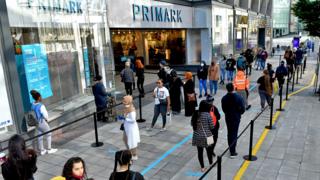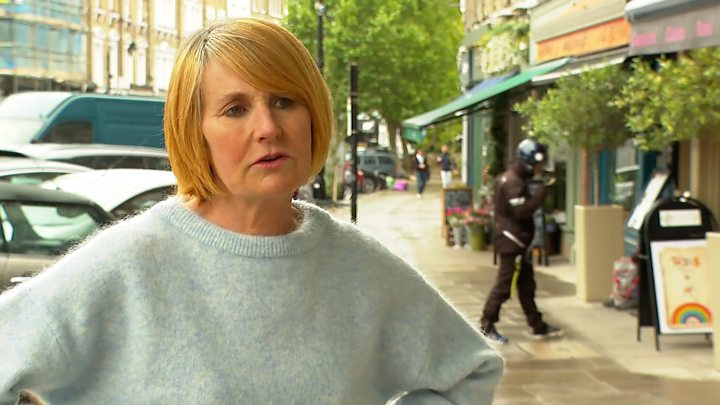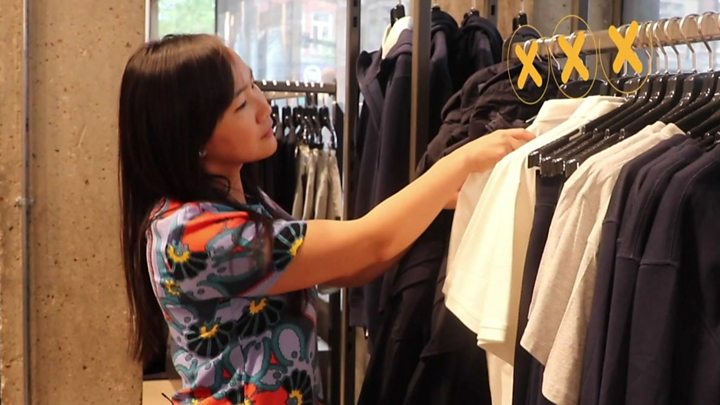
Image copyright
PA Media
Most shops – like this Primark in Birmingham – have been locked since 23 March
Pent-up demand has prompted queues at some shops as rules are relaxed in England after a three month lockdown.
Long queues were reported outside Primark shops in London and Birmingham ahead of their 8am opening time.
The chain, which like other clothing shops has been closed since 23 March, does not offer online shopping meaning customers can only buy in the store.
All shops in England are allowed to open, although retailers have had to introduce strict safety measures.
Jaydee Darrock, from Warwickshire, was one of the first inside Primark’s Birmingham store after queuing from about 07:00. She described it as “surprisingly calm”.
“We thought it would be chaotic, it’s not, it’s quite nice,” she said.
In Manchester, people waited for almost an hour for some shops. Big queues formed outside Primark,TK Maxx and Foot Locker.
Although food shops, pharmacies, banks and other essential retailers have stayed open, vast swathes of the High Street, from bookshops to clothes outlets, have been closed since 23 March.
HMV owner Doug Putman told the BBC’s Today programme that he expected a rush in the first week of trading after his shops open their doors. But he said retailers could be faced with a problem if shoppers do not return in the same numbers as before the lockdown.
“If you’ve got the same cost structure to run the business but sales are down even 20% it makes a lot of companies unviable.”
“We’re being very hesitant, we believe that it is going to be a tough year.”

Media playback is unsupported on your device
Retailers are required to introduce plastic screens at the tills and floor markings to keep shoppers two metres (6ft 5ins) apart – measures that are already a regular fixture in supermarkets.
Other measures will include pleas not to touch items unless customers intend to purchase them and decontaminating shopping baskets after each use. Retailers are promising there will be plenty of sanitiser on hand for customers. Toilets will remain closed in Primark’s shops but facilities in other stores, including John Lewis and Selfridges, will be open.
In most clothes shops, fitting rooms will be closed. Bookshops including Waterstones intend to put items in quarantine if browsed but not bought, while some jewellers are introducing ultraviolet boxes that can decontaminate items in minutes.

Media playback is unsupported on your device
Not all stores will throw open their doors immediately. John Lewis will reopen just two outlets on Monday – in Kingston upon Thames and Poole – as part of a phased approach, with 11 others to follow on Thursday.
The number of customers entering stores will be regulated. Andrew Murphy, executive director of operations, does not expect a lifting of the measures any time soon. “We expect this situation to last well into autumn and perhaps winter so we need to be thinking ahead for how things will work when the weather’s not so great,” he said.
Major High Street chains start to unlock
- John Lewis will start by opening 13 branches in stages
- Next will reopen just 25 of its 500 stores at first
- Debenhams will reopen 50 stores in England and three in Northern Ireland
- Marks and Spencer will open all its shops in England and Northern Ireland
- JD Sports is reopening all 309 of its stores in England
- Primark is reopening all 153 of its stores in England
- Argos, which has kept outlets in Sainsbury’s stores open, will reopen 145 standalone stores for click and collect
- Topshop is reopening all its stores in England and selected ones in Northern Ireland
Some other retailers selling products classed as essential – such as DIY, furniture and bicycles – have also been reopening. Furniture giant Ikea opened 19 of its stores across England and Northern Ireland recently, prompting long queues.
Many stores are encouraging customers to make purchases by contactless card payments, with limits increased to £45. Arcadia, which owns the likes of Topshop, Miss Selfridge and Dorothy Perkins, has said it will not accept cash.
London’s West End, which includes Oxford Street, is expecting about 80% fewer visitors when it reopens on Monday.
The British Retail Consortium (BRC), the trade body representing the sector, warned that the unlocking was unlikely to provide any immediate boost for the sector.
Helen Dickinson, BRC chief executive, said: “A mix of low consumer confidence and limits on the number of people able to enter stores mean that many shops will continue to suffer lower footfall – and lower sales – for some time to come.”
She called on the government to help stimulate demand with a short-term cut in VAT or a temporary income tax cut for lower-income workers.
In Northern Ireland, non-essential shops reopened on Friday, but there is still no date for Wales and Scotland.
In England, pubs, restaurants, hairdressers, hotels and cinemas will not be allowed to open their doors until 4 July at the earliest – and even then, only if they can meet social distancing measures.
Key to a successful reopening of the economy is the two-metre social distancing rule, the hospitality industry says. Pubs and restaurants have warned that they cannot make money if customers are required to keep two-metres apart, and have urged that the distance limit be reduced to one metre.
Mr Johnson has commissioned a review into two-metre distancing, saying there was “margin for manoeuvre” as the number of coronavirus cases falls.
The government is under intense pressure to get the economy moving as fears grow of a new wave of job losses as furlough scheme that has supported eight million workers is wound down.
Are you returning to the shops today? Share your experiences by emailing haveyoursay@bbc.co.uk.
Please include a contact number if you are willing to speak to a BBC journalist.
Source link
